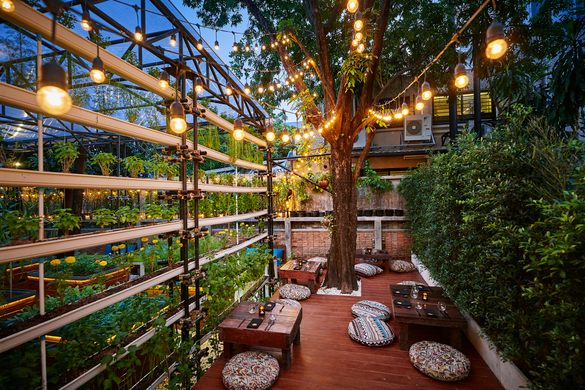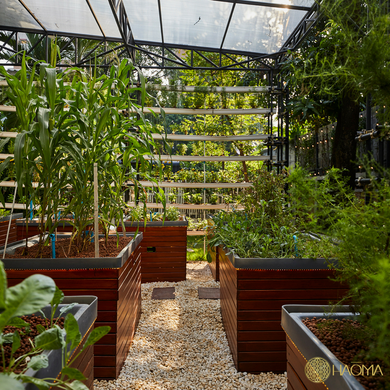Haoma Bangkok
Michelin-starred neo-Indian dining with on-site urban farm
Michelin-starred neo-Indian dining with on-site urban farm









"At Haoma (One MICHELIN Star and Green Star), a seasonal and local ethos drives the menu. Chef Deepanker Khosla sources ingredients from the restaurant’s own garden and carefully selected farmers, breeders and fisherfolk to create innovative, mindful dishes. Khosla’s commitment to a more conscious gastronomy includes conserving over 50,000 gallons of rainwater for the aquaponics farm, and recycling water with Nordaq systems. During the pandemic, the restaurant expanded to raise chickens and goats, directly contributing to its evolving menu. Signature dishes include lobster with pulissery, caviar and ghee roast bao; lamb with mustard mash; and a seasonal teardrop pea with trout eggs, shrimp pickle and nasturtium." - The MICHELIN Guide
"Chef Deepanker Khosla says of his Haoma team, "We grow what we cook, we cook what we love.” And what is that? Sustainable, seasonal, local ingredients sourced from farmers, breeders, fisherfolk and the restaurant’s own garden. They’re turned into delicious, beautifully plated neo-Indian dishes that form seasonal tasting menus (including a vegetarian one). It all happens in a Nordic-style dining room where even the decor includes unused plant parts." - Michelin Inspector
"Boasting one of Thailand’s only MICHELIN Green Stars and one MICHELIN Star, this neo-Indian pioneer led by Chef Deepanker ‘DK’ Khosla is an experience unlike any other, sourcing produce from an on-site hydroponic garden and fishery and from the team’s own farm in suburban Bangkok." - Craig Sauers
"An Indian restaurant using sustainable, seasonal, local ingredients sourced from farmers, breeders, fisherfolk, and its own garden to create delicious, beautifully plated Indian dishes in à la carte and seasonal tasting menus (including a vegetarian one). It grows fish in rainwater conserved throughout the year for its own aquaponics farm, recycles using Nordaq water systems for guests to consume, and during the pandemic started a farm in Bangkok to raise chicken, goats, and cows for use in its ever-evolving menus." - MICHELIN Guide Thailand
"If the farm gets any closer to the table at Haoma, customers will be sitting in dirt. In the humid buzz of Thailand’s capital, this urban farm and fish pond within a fine-dining restaurant take sustainability to a new level. Pass through a long driveway framed by edible flowers in a remote corner of Bangkok’s Asoke neighborhood and you’ll arrive at what claims to be the first urban farm and zero-waste restaurant in the country. A server will take you on a tour of both the aquaponic and vertical farms that together supply some of the menu’s produce. A large koi pond stretches the length of the building. The evaporation from the pond keeps the building cool while the waste from the fish (which appear on the menu themselves) is circulated throughout the aquaponic section to deliver nutrients to more delicate produce such as mizuna, mint, borage, and dill. The chic restaurant was designed with juxtaposition in mind. The serene dining room is nestled within the bustle of Asoke, with warm wooden accents tempering the edge of black metal. Simple produce from the farm is transformed into edible works of art, often using complex molecular techniques. Neo-Indian tasting menus using hyper-local Thai ingredients highlight head chef Deepanker Khosla’s expertise while also employing the farm’s multitude of fresh fish and greens. A refined galouti kebab dish is enhanced by citrus gel and Thai truffles, while a dish called “Prawns on the Rock” couples tamarind with peanut and lime foam. “Haoma in a Bite” is comprised solely of ingredients harvested from the premises: house carp gets topped with mustard greens and a seven-herbed chlorophyll jelly before kombucha SCOBY crisps are crested atop. In the name of zero waste, much of the cocktails are made up of scraps from the kitchen. Strawberries (along with their oft-discarded stems) are juiced and hardened into the fruit leather that graces the simply named “Strawberry” cocktail, while the tongue-in-cheek “Kale” slips gin into a blend of up-cycled avocado, kale, apple, and celery. This secluded, verdant pocket of Bangkok may have just cracked the sustainable restaurant code. With Haoma racking up an impressive list of awards, diners may have to make reservations weeks in advance for a tasting course of the future." - ATLAS_OBSCURA
